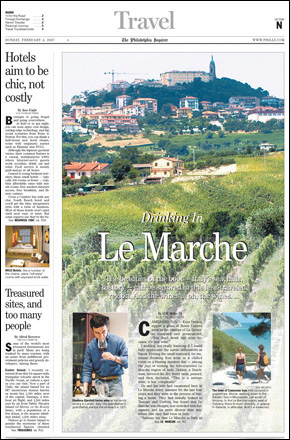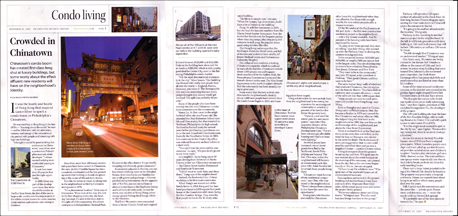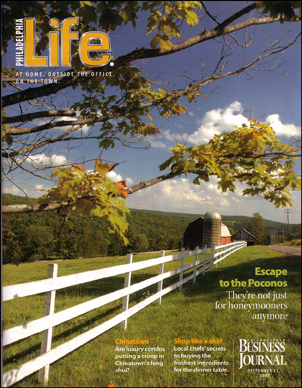Crowded in Chinatown
Chinatown's condo boom has created first class feng shui buildings but some worry about the effect affluent new residents will have on the neighborhood's identity.
Published in the September 2007 Philadelphia Life magazine.
It was the hustle and bustle of Hong Kong that made Lance Silver spark a condo boom in Philadelphia's Chinatown.
He was traveling in Hong Kong in the late 1970's - "learning about the world," he quips - and he fell in love with the adventure, romance and energy of the international city packed with people and brimming with high-rise buildings.
"I thought it would be great to bring that excitement to Chinatown," says Silver, now a prominent Philadelphia area real estate developer. "I always wanted to bring more residential housing to Chinatown."
It took him more than 25 years to find just the right opportunity.
In 2003, Silver was part of the development team that introduced the condos at TenTen Race Street, the first of the recent, large-scale, market-rate housing projects in the ethnic enclave known more for exotic eateries, Asian markets and ceramic cats waving in windows.
Since then, more than 500 luxury residential spaces have been created in Chinatown, the once derelict Franklin Square has been completely overhauled, and the first ground-up residential building in decades is sprouting at the corner of 9th and Arch Streets.
New life, for better or worse, is taking root in the neighborhood settled by Cantonese immigrants in 1870.
"It's a phenomenal location," Silver says of Chinatown. "If you look at the map, it's next to the best shopping in the city, the Reading Terminal. It's next to the train station. It's right off of the expressway. It's almost contiguous to Independence National Park. It's next to the office district. It's got terrific shopping and obviously, great restaurants."
Immediately adjacent to TenTen, you can buy almost anything Asian at the Shanghai Bazaar, from nunchucks and Buddha statues to silk gowns and guzhengs - Chinese plucked-string instruments. On the opposite side of TenTen, you can eat red bean or almond butter buns at the Mayflower cafe and bakery (only 60 cents each). Across the street, you can dine at Wong Wong, where orange-glazed Peking duck hangs whole in the windows.
The 96 condos were converted from the former Clarion Hotel and originally listed between $125,000 and $325,000. Units in the building have since sold for as much as $385,000, which is still a pretty good deal for Center City, even in the flattening Philadelphia condo market.
"It is the most international community in the city," Silver boasts. "Our building was blessed with really neat people from all over the world - England, France, Germany, you name it. The demographic mix was very surprising because many people thought only Asians would get involved. The split was probably 60 percent Occidental."
Many of the people who have been moving into the new Chinatown condos have connections to the community.
Nancy Lo, 34, first came to the neighborhood when she was 9-years-old. She attended the Holy Redeemer School, near 9th and Vine, but then traveled to Northeast Philadelphia for high school. She lived in Bucks County for several years before purchasing a penthouse condo in the new Grandview Condominiums, formerly the Hawthorne Suites, in 2004. Lo's commute to her Center City office was reduced from over an hour's drive to a short walk.
"You can't beat the price and the convenience," Lo says. "We practically go out to eat every night."
Lo's neighbor, Anita Fung, spent 30 years driving from Newtown, Bucks County to her two Chinatown restaurants - the Cherry Street Kosher Restaurant and Southeast Restaurant.
"I didn't want to work there and sleep there," Fung says of the neighborhood.
Instead, she bookended her 14-hour workdays with 60 minute commutes.
When Fung's son moved out of the family home in 2004, Fung and her husband purchased a 2,000 square-foot, Ben Franklin Bridge-facing penthouse at the Grandview. They were the first people to live in the 16-story, renovated building.
"My life is so simple now," she says. "When I'm hungry, I go downstairs. And I have a lot of friends in the building."
Fung, 59, sold her businesses in 2005 but she kept the karaoke machine from the Cherry Street Kosher Restaurant. Now she invites her friends over for frequent parties where they sing songs, play ping pong and compete in mah jong, the popular Asian game using domino-like tiles.
The Hong Kong native says that the building is about one-third Asian, and full of doctors and residents from nearby Jefferson Medical Center and Hahnemann University Hospital.
John Chin, the executive director of the Philadelphia Chinatown Development Corporation, says that historically, there has never been enough housing in the neighborhood. Chinatown crowds about 5,000 people into a 28 square-block area bound by the Gallery Mall, the Pennsylvania Convention Center and the historic district to the east. The Vine Street Expressway to the north is a giant obstacle that the community has been steadily trying to grow past.
About 1,000 new people have arrived since the condo boom began in 2003, and housing prices have surged. Long a destination for new arrivals from Asia, the neighborhood is becoming too expensive for an immigrant community that has 61.5 percent of its families living below the poverty level.
"There is a real need for rental units for new immigrants," Chin says. "There's been not enough affordable housing and that's an issue we're fighting."
As rental prices have increased, recent immigrants have fled to the Northeast, South Philadelphia and beyond. The fear, Chin says, is that the neighborhood will become an amusement park-like place with Asian facades but no actual Asian people living in the neighborhood.
"Chinatown must have an ethnic residential component," says Chin, who was raised in the neighborhood. "There's always been a desire to live there but never the opportunity."
Immigrants who become successful in Chinatown often leave the neighborhood when they can afford to. The new condo projects offer a chance for some to return.
Of the 90 condos at the Pearl - the first new construction residential project in the neighborhood - only a few remain available. And 95-percent of the housing units have been purchased by Asians.
"As soon as we broke ground, they started calling," says Julie Wong, who teamed up with the Parkway Corporation to develop the modern-looking mid-rise at 9th and Arch.
Units are priced between $250,000 and $400,000, or roughly $400 per square foot in the largest units. They are drawing empty nesters from suburban Pennsylvania, New Jersey, Delaware and New York.
"They want to be in the community," says Jake Winigrad of Parkway. "They speak Chinese and they want to be here."
The units feature large walls of windows that overlook Chinatown, the city skyline and the historic district. They have built in cabinetry and compact efficiency - most of the units are less than 1,000 square feet.
"Asian people are used to small units, especially people from Hong Kong," says Wong.
Born in Shanghai and raised in Taiwan, Wong came to Philadelphia in 1966. She became a realtor in 1978 and then opened the first Chinatown real estate office in 1982. She helped bring the first bank to the neighborhood in 1989. She now lives on the northern edge of the neighborhood, just above the Vine Street Expressway.
There is no fourth floor in the Pearl and there are no units that end in four, as the word for four in Chinese is very similar to the word for death. The front doors of units are staggered so that no one could possibly open their door and see into a neighbor's home - another Chinese taboo.
A feng shui expert chose the groundbreaking day and time. Winigrad says he was worried about the event because on the morning of the ceremony, rain poured from the sky. But as the ceremony began exactly at 10 am, the rain stopped.
"I'd have to say I'm a believer now," Winigrad says of the mystical Chinese practice.
Dancing lions performed at the groundbreaking and monks blessed every floor and each of the ten ground floor retail units. All the retail spaces were sold before the project broke ground.
"We're very adamant about not killing blocks," Winigrad says. "Plus the retail business brings business to the garage."
Parkway will operate a 120-space surface lot adjacent to the Pearl. Four, 16 foot-long, bronze Chinese dragons representing the four main rivers in China will adorn the entrance to the lot.
"It's going to be another attraction for the tourists," Wong says.
Parkway is also investing in another massive project in the neighborhood. In the fall, they will break ground on a 23-story building at 12th and Arch Streets that will include 150 condos, as well as a 250 room W Hotel.
"We felt strongly that Chinatown was an underserved market," Winigrad says.
One block away, 35 condos are being created in the former Bell Telephone offices at the corner of 13th and Arch. In a 9-story building that once housed Doc Johnson's, the renowned porn emporium, the Arch Street Exchange offers European-style lofts and penthouses that are listed at more than $1.1 million.
The most unusual condo conversion units were created in the golden, figure-eight-shaped MetroClub Condominiums at 8th and Race.
"We thought the curves in the building would create some really interesting lines," says Ron Caplan, president of Philadelphia Management Company, the developer of the project.
The 129-unit building sits near the base of the Ben Franklin Bridge, within walking distance to Center City and with quick access to interstates 95 and 676.
"It is the single most accessible spot in the city by car," says Caplan. "From a driving standpoint, there is no more strategic a location."
Across the street is the leafy Franklin Square, one of William Penn's original green parks. Where homeless people once slept and trash piled up, a colorful carousel provides carnival music and children's laughter. Tourists play putt-putt in a Philly-themed course. The restored fountain sprays water majestically into the air. And elderly locals perform tai chi in the early morning hours.
There isn't a large Asian population living at the MetroClub despite its location. The property was previously a hospital, and many Asians are superstitious about living in an edifice where many people died over the years.
Still, Caplan says the convenience and the amenities - private pool, fitness room, and doorman, among other features - make the nearly sold-out MetroClub special.
"It's probably one of the best places in town to live," he says.







